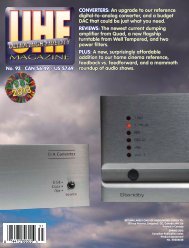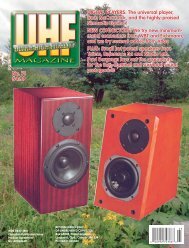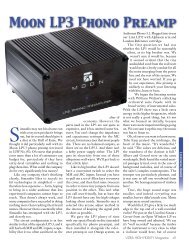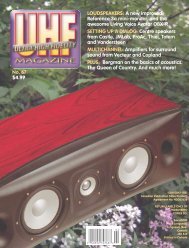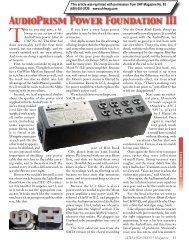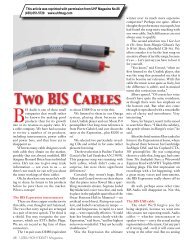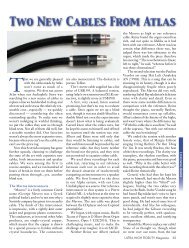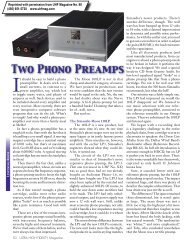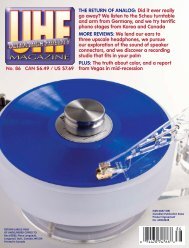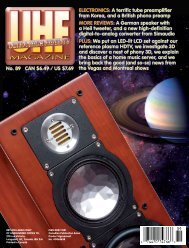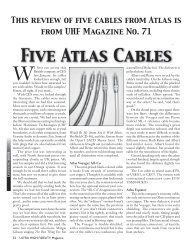THE CD PLAYER PLUS - Ultra High Fidelity Magazine
THE CD PLAYER PLUS - Ultra High Fidelity Magazine
THE CD PLAYER PLUS - Ultra High Fidelity Magazine
Create successful ePaper yourself
Turn your PDF publications into a flip-book with our unique Google optimized e-Paper software.
UHF <strong>Magazine</strong> No. 87 was published in October, 2009. All<br />
contents are copyright 2009 by Broadcast Canada. They<br />
may not be reproduced or transmitted in any form, or by any<br />
means, electronic or mechanical, including photocopying,<br />
recording, or any information storage or retrieval system,<br />
without written permission from the publisher.<br />
EDITORIAL & SUBSCRIPTION OFFICE:<br />
Broadcast Canada<br />
Box 65085, Place Longueuil<br />
LONGUEUIL, Québec, Canada J4K 5J4<br />
Tel.: (450) 651-5720 FAX: (450) 651-3383<br />
E-mail: uhfmail@uhfmag.com<br />
World Wide Web: www.uhfmag.com<br />
PUBLISHER & EDITOR: Gerard Rejskind<br />
EDITORIAL: Paul Bergman, Steve Bourke, Toby Earp, Reine<br />
Lessard, Albert Simon<br />
PRODUCT PHOTOGRAPHY: Albert Simon<br />
ADVERTISING SALES:<br />
Alberta & BC: Derek Coates (604) 522-6168<br />
Other: Gerard Rejskind (450) 651-5720<br />
NATIONAL NEWSSTAND DISTRIBUTION:<br />
TransMedia Group Inc. / Stonehouse Publications<br />
1915 Clements Rd. Unit 7, Pickering, ON L1W 3V1<br />
Tel: (905) 428-7541 or (800) 461-1640<br />
SINGLE COPY PRICE: $6.49 in Canada, $7.69 (US) in the<br />
United States, $10.75 (CAN) elsewhere, including air mail.<br />
In Canada sales taxes are extra. Electronic edition: C$4.30,<br />
all taxes included<br />
SUBSCRIPTION RATES:<br />
CANADA: $62.50 for 13 issues*<br />
USA: US$75 for 13 issues<br />
ELSEWHERE (air mail): CAN$118 for 13 issues<br />
*Applicable taxes extra<br />
ELECTRONIC EDITION: C$43, 13 issues, taxes incl.<br />
PRE-PRESS SERVICES: Transcontinental<br />
PRINTING: Interglobe-Beauce<br />
ELECTRONIC EDITION: www.magzee.com<br />
FILED WITH The National Library of Canada and<br />
La Bibliothèque Nationale du Québec.<br />
ISSN 0847-1851<br />
Canadian Publications Mail Sales Product No. 0611387<br />
UHF invites contributions. Though all reasonable care will<br />
be taken of materials submitted, we cannot be responsible<br />
for their damage or loss, however caused. Materials will<br />
be returned only if a stamped self-addressed envelope is<br />
provided. It is advisable to query before submitting.<br />
<strong>Ultra</strong> <strong>High</strong> <strong>Fidelity</strong> <strong>Magazine</strong> is completely independent of<br />
all companies in the electronics industry, as are all of its<br />
contributors, unless explicitly specified otherwise.<br />
4 ULTRA HIGH FIDELITY <strong>Magazine</strong><br />
Editorial<br />
Changes<br />
There is no free, there’s only “who’s paying.”<br />
I’ve just heard that phrase on the radio. The subject was water, but it seems<br />
to me equally suited to the changing role of the media: music, movies, television,<br />
newspapers, and of course magazines like this one.<br />
But how do you convince people in the age of the Internet that there’s no<br />
such thing as free? Isn’t the Net full of free information? And was it not said<br />
that “information wants to be free”?<br />
Actually, not quite. The phrase is from Stewart Brand, whose work with<br />
The Whole Earth Catalog and its later offshoots was a seminal influence on<br />
UHF. Brand’s entire phrase reads like this:<br />
On the one hand information wants to be expensive, because it’s so valuable.<br />
The right information in the right place just changes your life. On<br />
the other hand, information wants to be free, because the cost of getting it<br />
out is getting lower and lower all the time. So you have these two fighting<br />
against each other.<br />
The World Wide Web did not yet exist when Brand said that, in 1984, but<br />
once it arrived it greatly lowered the cost of getting information “out there.”<br />
Putting out music meant pressing an LP or a <strong>CD</strong>, packaging it and shipping<br />
it. Today the music can be sent to anyone who wants it for only the cost of<br />
bandwidth, which keeps dropping. Putting out news meant typesetting,<br />
making printing plates, churning paper through giant presses, then trucking<br />
the publication to thousands of newsstands. Today the same news is available<br />
worldwide, for free.<br />
Only who’s paying?<br />
Television was free, because advertisers were paying for the privilege of<br />
pitching their products. Today a majority of TV channels are pay channels.<br />
You can actually buy programs at the iTunes store, and DVD stores are filled<br />
with full-season collections of Sex and the City, Six Feet Under and Lost. Radio<br />
was free, with sponsors, donors or taxpayers picking up the high cost of running<br />
powerful transmitters. Today a radio program can be streamed on the<br />
Internet, not for free but nearly.<br />
The trouble with information that can be put “out there” for next to nothing<br />
is that just anyone can put it out. That has made blogging and Facebook<br />
possible, to be sure, but you still need to ask who’s paying. Remember that<br />
companies are willing to spend millions of dollars to air a 30-second commercial<br />
during the Super Bowl. You think they won’t leap at the chance of<br />
getting “information” to you over an almost-free medium like the Internet?<br />
On radio and TV you mostly know what is programming and what is a commercial.<br />
On the Internet, don’t count on it.<br />
I don’t mean to sound as though I’m anti-Web. Our arrival on the Web,<br />
which dates from 1996, has given UHF its worldwide presence. Of course it<br />
will, more and more, force shifts in our business model, as it has done with<br />
the record industry, Hollywood, and the newspapers.<br />
Oh…and about that phrase with which I began? It was on a CBC radio<br />
program called Outfront. Ironically, it’s one of the programs CBC cut last<br />
June, for lack of funds. Until now the program has been free, only now no<br />
one is paying.



